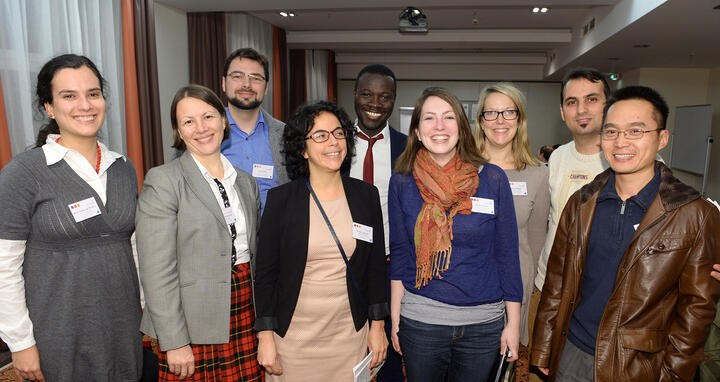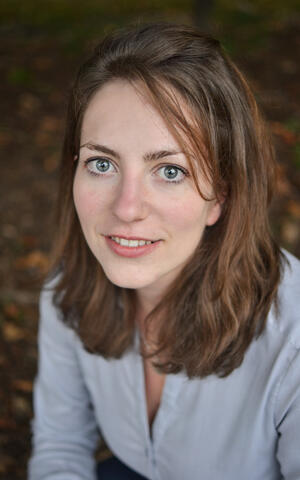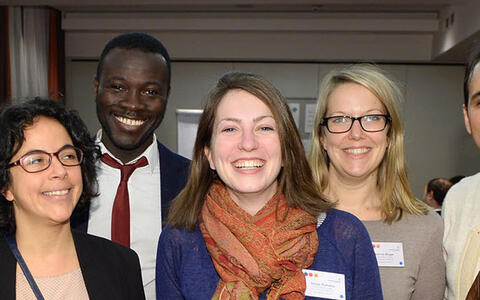Outside of academia – still on the forefront of curiosity-driven thinking
According to the report of the British Royal Society, “The scientific country – securing our future prosperity”, only 3.5% of PhD graduates obtain a permanent research position, and only 0.45% achieve a professorship. These daunting numbers make prospects for PhDs seem dim. To address this issue, the MDC has established a Career Pathways Lecture Series where invited speakers, including many alumni, reflect on their own research experiences and where they work today.
Photo: Lauren Hamlet-Williams
A proven academic researcher
As a PhD student, Sonya Dumanis had heard Prof. Thomas Willnow give a talk at a conference on the genetic causes of Alzheimer’s disease pathology. Intrigued by his presentation, she approached him and inquired about an opportunity to join as a post-doc. Sonya became a post-doctoral research fellow at the MDC in the Willnow lab from 2013 to 2015. Looking back, Dr. Willnow states that he received “the most impressive CV” he had ever seen from a student and qualified her later research in his lab as “outstanding science”.
Already during her PhD, she had received a National Science Foundation fellowship, a NIH pre-doctoral research training award, the Mark A. Smith prize from the Journal of Neurochemistry and the Glassman Award for the best science thesis dissertation at Georgetown University (USA), where she obtained her PhD in Neuroscience. Sonya joined the MDC bringing her own funding, a highly competitive fellowship from the Alexander von Humboldt foundation. In 13 years as an active researcher Sonya has published 16 research papers in the fields of physics and neuroscience, five as first author. Additionally, she published three papers on undergraduate and graduate educational science programs. With these impressive academic achievements, Sonya easily brings the required backpack to walk the steep way up to the academic mountaintop. But instead of taking this expected path, she is actively engaged in reaching another summit.
New goals in Washington, DC
Sonya Dumanis (middle) as a guest at the MDC.
She now works as a senior associate at the Center for Strategic Philanthropy at the Milken Institute in Washington DC (USA). Philanthropists, persons that actively promote human welfare, approach this center to better understand how best they could support solving specific problems related to improving health and treatments of diseases. To guide them and to help them to decide on the best strategy, Sonya assesses the research landscape, navigating R&D’s trickiest developments and the newest scientific discoveries, to outline potential philanthropic opportunities that could address unmet needs in biomedical and health research.
What makes research so interesting
When asked about her scientific idol, Sonya enthusiastically recalls a speech from Oliver Smithies, Nobel Prize laureate in 2007. “He showed the audience his notes from when he uncovered homologous recombination. His notebook was full of messy scribbles. Often people think of science as being super clean, that everything happens in a clear logical way. But in reality, as you do research, it drives you to directions you could not have planned. That is what makes research so interesting, because it is unpredictable.” It’s that exciting curiosity for the unknown and thirst for knowledge that drives many researchers. It’s what made Sonya interested in science in the first place. When deciding to leave academia, she did not think about the statistics of the Royal Society. She was attracted by the exciting prospects and possibilities that lay ahead in this new career path.
The right attitude for success
Sonya’s outlook on life becomes clear when you ask her about her favorite hobby. Sonya loves running. “There was one time,” she mentioned, “that I forgot my keys on a morning run and I had to run the Pankeweg all the way to the MDC to get my spare keys, which I kept at work. Once I did that route once, I started to run it at least once a week.” This weekly 14 km route inspired her to complete her first marathon, which she successfully completed in Berlin in 2014.
When you ask her friends what it is that keeps her going, they tell you that she does what she considers meaningful and can make a difference. When you ask Sonya for career advice, she simply states: “Do what you find interesting and be open to not always talking the straight path forward.”
Author: Katja Herzog, PhD student in the Willnow group.







